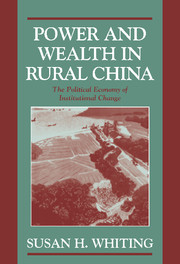Crossref Citations
This Book has been
cited by the following publications. This list is generated based on data provided by Crossref.
Levi, Margaret
2000.
The Economic Turn in Comparative Politics.
Comparative Political Studies,
Vol. 33,
Issue. 6-7,
p.
822.
Wedeman, Andrew
2001.
Incompetence, Noise, and Fear in Central-Local Relations in China.
Studies in Comparative International Development,
Vol. 35,
Issue. 4,
p.
59.
Park, Albert Francis
and
Shen, Minggao
2001.
Decentralization in Financial Institutions: Theory and Evidence from China.
SSRN Electronic Journal ,
Huang, Yasheng
2002.
Selling China.
Peerenboom, Randall
2002.
China's Long March toward Rule of Law.
Bernstein, Thomas P.
and
Lü, Xiaobo
2003.
Taxation without Representation in Contemporary Rural China.
Wei, Yehua Dennis
2004.
Trajectories of Ownership Transformation in China: Implications for Uneven Regional Development.
Eurasian Geography and Economics,
Vol. 45,
Issue. 2,
p.
90.
Lai, Hongyi Harry
2005.
Contrasts in China and Soviet reform: Sub‐national and national causes.
Asian Journal of Political Science,
Vol. 13,
Issue. 1,
p.
1.
Ye, Xinyue
and
Wei, Yehua Dennis
2005.
Geospatial Analysis of Regional Development in China: The Case of Zhejiang Province and the Wenzhou Model.
Eurasian Geography and Economics,
Vol. 46,
Issue. 6,
p.
445.
Wibbels, Erik
2005.
Federalism and the Market.
Zhang, Jianjun
2007.
Business associations in China: Two regional experiences.
Journal of Contemporary Asia,
Vol. 37,
Issue. 2,
p.
209.
Solinger, Dorothy J.
2007.
Labor Discontent in China in Comparative Perspective.
Eurasian Geography and Economics,
Vol. 48,
Issue. 4,
p.
413.
Chan, Kam Wing
2007.
Misconceptions and Complexities in the Study of China's Cities: Definitions, Statistics, and Implications.
Eurasian Geography and Economics,
Vol. 48,
Issue. 4,
p.
383.
Wei, Y. H. Dennis
2007.
Regional Development in China: Transitional Institutions, Embedded Globalization, and Hybrid Economies.
Eurasian Geography and Economics,
Vol. 48,
Issue. 1,
p.
16.
2008.
Chinese Economic Development.
p.
555.
Liu, Ling
2008.
Local Government and Big Business in the People's Republic of China – Case Study Evidence from Shandong Province.
Asia Pacific Business Review,
Vol. 14,
Issue. 4,
p.
473.
Malesky, Edmund J.
2008.
Straight Ahead on Red: How Foreign Direct Investment Empowers Subnational Leaders.
The Journal of Politics,
Vol. 70,
Issue. 1,
p.
97.
Chan, Kam Wing
and
Wang, Man
2008.
Remapping China's Regional Inequalities, 1990-2006: A New Assessment ofde Factoandde JurePopulation Data.
Eurasian Geography and Economics,
Vol. 49,
Issue. 1,
p.
21.
Lora-Wainwright, Anna
2009.
Of farming chemicals and cancer deaths: The politics of health in contemporary rural China*.
Social Anthropology,
Vol. 17,
Issue. 1,
p.
56.
Burns, John P.
and
Xiaoqi, Wang
2010.
Civil Service Reform in China: Impacts on Civil Servants' Behaviour.
The China Quarterly,
Vol. 201,
Issue. ,
p.
58.



